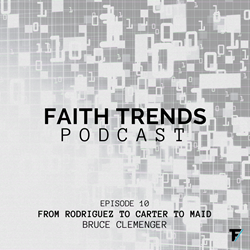Indifference on issues such as prostitution is not an option

→en français
At the EFC we are always tracking court cases, and sometimes cases arise that force us to consider the underlying norms of our society. These cases engage societal norms and principles of justice that underly not only the Canadian Charter of Rights and Freedoms, but our whole system of laws.
Our Criminal Code has been called a system of applied morality for good reason. It reflects a basic agreement about the importance of human dignity, human rights, and protecting each other from coercion and exploitation. Upholding the dignity of others also upholds it for ourselves.
The understanding and affirmation of human dignity is critical to our notions of mutual respect and our support for human rights. Where actions are harmful or an affront to human dignity, they must be deterred.
Human dignity is being disputed in the name of individual autonomy in Parliament and the courts.
This commitment to human dignity is being disputed in the name of individual autonomy in Parliament and the courts.
One of these disputes centres around our laws on prostitution. When Parliament introduced these laws in 2014, the legislation was based on the premise prostitution is inherently exploitative and undermines our societal commitment to human dignity. But this judgment about prostitution is being challenged in a case before an Ontario court.
Our current laws treat prostitution as a form of sexual exploitation that disproportionately and negatively impacts women and girls. Though some individuals believe they’re not being exploited when they participate in prostitution, Parliament concluded all prostitution undermines dignity and equality by objectifying the human body and by commodifying sexual activity.
It has consequences not only for the persons involved, but for our whole society. We cannot claim to uphold the dignity of every one of us and allow the prostitution of some of us. There’s no room for either ignorance or indifference.
As the EFC noted in our argument to the court, the United Nations Convention for the Suppression of the Traffic in Persons and of the Exploitation of the Prostitution of Others declares that both trafficking and prostitution are "incompatible with the dignity and worth of the human person, and endanger the welfare of the individual, the family and the community."
| Listen to Bruce Clemenger's recent guest appearance on the Faith Trends Podcast |
 |
As one justice of the Supreme Court said, it is "degrading to women" and "a form of slavery."
On issues like this there is no neutral stance. To have no law is to take sides on the morality of the practice and its impact on the social fabric of our society.
Those opposing the law argue that as willing participants their right to liberty is denied. The exercise of their individual autonomy, they believe, is intertwined with their dignity.
Psalm 82 urges us to defend the cause of weak people who are oppressed.
However, understanding prostitution as inherently exploitative means that engaging in prostitution can never be consistent with upholding someone’s dignity. It is not merely a personal and private choice. Rather, as we argued in court, "It raises fundamental questions of dignity and equality, and is inseparably tied up with such consequential issues as abuse, coercion, manipulation, assault, trafficking, physical and emotional trauma, harmful beliefs and attitudes about sex and gender, inequality and more."
These harms are endemic to prostitution and not elements that can be avoided by adjusting the legislation or twisting concepts of human dignity.
Scripture is replete with admonitions against exploitation and calls to care for vulnerable and marginalized persons. Psalm 82 urges us to defend the cause of weak people who are oppressed. Jesus uses prophecies about setting oppressed people free to announce the good news of the gospel (Luke 4:16–19). Christ was speaking truth to the powers that harm people. We can do no less.
It is critical we engage in the courts and debates about upholding human dignity and protecting vulnerable persons from exploitation, victimization and abuse. Society and our governing laws must be travelling in the direction of defending human dignity, not eroding it.
We advocate for people who need protection, for the dignity and equality of all. In this process, we promote an understanding of human dignity and respect for one another consistent with being created in God’s image. This is our witness, and this is our voice in Canadian society as Christians.
Bruce J. Clemenger is President of The Evangelical Fellowship of Canada. Please pray for our work and support us at www.TheEFC.ca/Donate or toll-free 1-866-302-3362.
